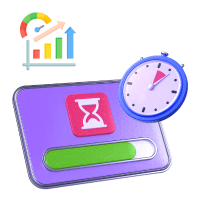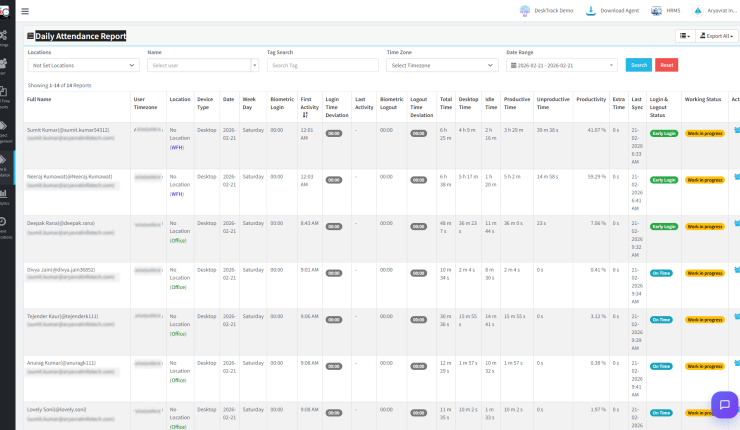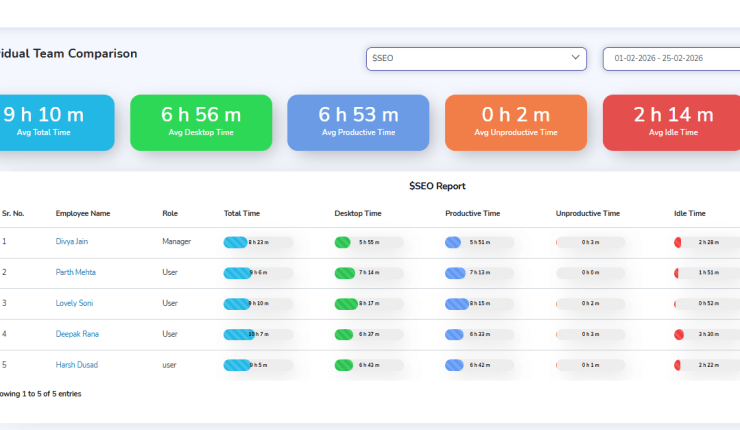Do you have high performing teams? Of course not. That’s why you are browsing this post. After going through this blog and implementing what we tell you the right way, we can guarantee that your teams will gradually perform exceptionally well. You just need to trust your teams, be consistent in your approach, and have some patience.
Another question is why some teams perform better than others? We will clear this question as well. In today’s blog, we will not only teach you how to build a high performing team, but also tell you all about the qualities such teams hold. Plus, we have covered many detailed and useful insights along the way. With that out of our way, let’s get started.
What are High Performing Teams?
These are teams that perform exceptionally well for your business. This group of individuals skyrocket their collective skills, multiple perspectives, expertise, and strengths to conquer even the most impossible-looking challenges and tasks. These staff members consistently hyper-focus on delivering outstanding results. Sometimes, even better than your expectations.
Why Do You Need High Performing Teams?
Make your workday more productive
Time tracking and work management can help you reach your goals
faster.
Having more and more high performing teams is beneficial for your organization in more than one way. These collectively bring in more profits for your business and continue to get better and better, providing you with:
1. Better Efficiency & Productivity
Teams with high performance are always consistently improving efficiency and productivity. No matter how tough the task is, they always brainstorm to achieve success through perseverance, teamwork, and coordination. Although these teams are not perfect, they learn from their mistakes and everyone tries to do their best in the future.
2. Challenging Outcomes Conquered
A high performing team conquers all challenges together. Every member contributes to the maximum of their skills, and thus, the workload becomes bearable. A great part about these teams is that everyone takes equal responsibility and accountability.
3. Increased Trust & Engagement
When teams are doing exceptionally well and the workflow is going smoothly, there is no need for constant intervention. This increases employee trust and engagement. As a bonus, it also saves you time and expenses as you just keep doing your work as usual, leaving all the essentials to your reliable teams.
4. Business Vision Actualization
High performance teams bring your broader objectives to reality. When every employee provides their collective input, it leads to the achievement of all the goals, which eventually fulfill your main targets, as goals align with what you wish to actualize.
5. High-Priority Goals Achieved
These Teams are skilled enough to understand which objectives are of high priority. Every member thus uses the right team and time management methods to bring everyone together to achieve these targets first in a streamlined way.
6. Consistent High Performance
As we mentioned before, high performing teams consistently improve their efficiency and productivity. They learn from their mistakes and try their best to keep improving through transparent and strong intercommunication.\
Read Also: Top 15 Time Management Goals for Employees in 2025
Qualities of High Performing Teams
So, what makes the said teams and employees different from others? These characteristics of high performing teams, such as work and mission alignment, and defined roles and responsibilities, make them unique:
1. Work & Mission Alignment
High performance teams know what the organization’s mission is and align their work to it. They always give their 100% to ensure that the tasks they complete always add more value to your broader objectives.
2. Defined Roles & Responsibilities
Such teams always pre-define their roles and responsibilities according to the project given. Since everyone knows what to do, there is no confusion, chaos, or employees blaming each other.
3. Respectful & Transparent Communication
This is the most unique characteristic of high performing teams. The communication is full of clarity, and the members respect each other’s perspectives, creating an environment where everyone can work together peacefully.
4. Two-Way Feedback
On one hand, there is the boss and employees with one-way feedback, which leads to zero improvement. On the other hand, there are high performing teams where everyone gives feedback to each other.
5. Priority-Based Work & Deadline Management
As we mentioned before, high performance teams work based on priority. Similarly, they manage all deadlines this way and ensure there is no work rush.
6. Connected & Aligned Managers & Teams
The main reason behind teams performing well is that the managers and employees are connected and aligned with the vision, mission, and broader objectives of your organization. This boosts the chances of success manyfold to around 100%.
7. Trust & Respect
This is due to trust, respect, and transparent communication that teams are able to work together, accepting diverse perspectives. They put their grudges and differences aside to work towards achieving all objectives.
8. Celebration & Recognition
Another thing that sets high performing teams apart is that they recognize and celebrate even the smallest achievements. This keeps all employees motivated and engaged enough to keep working better and better.
9. Continuous Learning
As we mentioned before, high performing employees and teams continuously learn. They accept their mistakes and then immediately strive to keep improving consistently over time. These teams capitalize on every opportunity to learn and adapt.
10. Short-Term Priorities Balanced with Long-Term Growth
These teams also don’t incline towards one or two things. Here, every member balances short-term priorities, such as mastering new skills, with long-term growth. What’s good here is that short-term priorities, such as these, collectively lead to future career growth.
What Do High Performing Teams Do Differently?

These were only the characteristics, but what do high performing teams do differently? Below, we have mentioned some of the aspects regarding what we have experienced so far.
1. Embrace Innovation & Adaptability
Teams with high performance accept and adapt to the changes. They are flexible enough to teach and help each other wherever needed to keep becoming better and better.
2. Cross-Functional Collaboration
For instance, sales teams with high performance cross-collaborating with the developers to know more about the said product. That’s because they will be able to make a better sales pitch this way and be more confident when answering queries during product demos.
3. Recognition & Achievements Focus
High performing teams focus on staying motivated by focusing on achieving all the goals. For further inspiration, these teams recognize success by, for example, the team manager throwing a pizza party on reaching a milestone.
4. Utilize Performance Processes & Technology
Of course, the ones that are engaging and easy to use. These teams are smart and utilize the performance processes and technology to gain benefits that also provide an advantage to you and your organization.
5. Mutual Accountability
Teams where everyone is equally accountable and responsible are the only ones where work performances are always exceptionally high with quality deliverables. That’s because they don’t blame each other for any delays or mistakes.
9 Proven Secrets for Building High Performing Teams
So, now we know all about them. Moreover, how to build a high performing team? We tried and tested 10 proven tips and secrets that work without the need to take long and boring training sessions:
1. Make Shared Purpose-Senses
The first step towards building high performing teams is to have a common sense of purpose. Your teams must think of your vision as their own for this to work.
2. Streamline Communication
There is no place for communication gaps in teams with high performance. The idea is to streamline communication by using effective channels and common messaging apps with user-friendly interfaces.
3. Empower Multi-Level Decision-Making
This is where the ego usually takes over and prevents awesome outputs from occurring. We are not saying that you have to entirely leave everything to your teams. The final decision is still yours. However, teams feel empowered and perform better even if they get some level of decision-making power.
4. Recognize & Reward Achievements
The next step is not to keep your satisfaction to yourself. Recognizing and rewarding achievements keeps teams motivated enough to keep performing well and putting in more and more effort.
5. Develop Your Employees
As we mentioned before, high performing teams adapt to changes and innovations in technology to be better suited for working on the latest projects. When given the opportunities and time, you too can develop your employees with new skills.
6. Be SMART
This is a concept that makes your teams perform exceptionally well. SMART expands to specific, measurable, achievable, relevant, and time-bound. Apply this to your goals, and you are good to go because you can’t have your development teams create sales pitches.
7. Resolve Conflict
Conflict occurs when two, more, or all members of the team don’t agree on perspectives. If this keeps going on, you can forget getting high performances. So, you need to step in fast and solve the issue to get your teams back on track. One way to understand team psychology better is to improve your emotional intelligence.
8. Understand All Dynamics
To have your teams perform exceptionally well, you need to understand how they are currently working and then develop them to adapt to how they need to work in the future.
9. Establish Trust
For all members in a group to work together, they need to trust each other. This is the hardest thing to do. However, the most rewarding as well. We recommend implementing team-building activities into the workflow.
Read Also: Top 10 Best Jira Alternatives for 2025
People Responsible for Building High Performing Teams
Building high performing teams is not a one-level task. However, it’s a multi-level task, where everyone, including leaders, managers, HRs, and employees, has their roles and responsibilities:
|
They set direction and clarity around the most crucial work objectives. Leaders also need to adapt as business requirements change. |
|
The role of HR is to drive performance management, ensuring the effectiveness of initiatives |
|
Managers filter the essential details from the ones documented by HR and leaders and convey these ideas to the teams. |
|
Employees must also actively participate in performing well and analysing it. |
How to Build a High Performing Team with the Right Software Solution?
If you have a business with large teams and diverse working models, such as remote and hybrid, you need a software solution assistant to skyrocket performance. A performance management software solution, such as DeskTrack, will be a good option. Here’s why.
1. Transparent & Aligned Goals
The software solution provides you with a user-friendly setup to configure your goals and align them with your vision. When these objectives are shared, there is 100% clarity, which brings everyone to the same page.
2. Employee Feedback
This feature is to provide feedback to and take feedback from employees. The suggestions given here are free of bias and employer favoritism. Plus, you can even configure the tool to keep all feedback anonymous.
3. Performance Reviews
Similarly, you will also get data-based performance reviews, which help a lot when you are stuck in a difficult decision-making situation.
4. Real-Time Recognition
Since you can configure KPIs in your software to manage team performance, every time there is an exceptional result, the software recognizes the employee (s) responsible in real-time.
5. One-on-One Meetings
The tool also provides you with effective communication channels and modules to take one-on-one meetings to upgrade skills and get high performing teams. This is regardless of the whereabouts of your teams.
6. Talent Reviews
The software solution also lets you build a team of talented human resources with its exceptional data-based talent reviews.
7. Succession Planning
By comparing the previous performances within seconds using AI-powered features, the software can also help you make better plans for future success. That is, to get better results for similar projects.
Real-Time Monitor Your High Performing Teams with DeskTrack
So, we can presume you have high performing teams by implementing the proven tips and secrets we covered. However, how will you track whether these teams are consistently improving efficiency or not? DeskTrack’s employee monitoring and time tracking features are your answer. You get to know how much, when, what, and where your teams are doing work and where it’s taking your organization’s overall productivity from user-friendly dashboards. That too, in real-time. With the tool’s intuitive features, including screenshot monitoring, app, URL, and file usage tracking, time tracking with data analytics, and automatic time categorization, you will have the best, most accountable, responsible, and productive teams. Try free for 15 days and see for yourself why 8000+ businesses trust DeskTrack.
Frequently Asked Questions (FAQ)
Q. What are High Performing Teams?
Ans. These are teams that perform exceptionally well in your organization. This group of individuals skyrocket their collective skills, multiple perspectives, expertise, and strengths to conquer even the most impossible-looking challenges and tasks.
Q. What are the Qualities of Teams that Perform Exceptionally?
Ans. These characteristics set high performing teams apart from those that don’t.
- Work & Mission Alignment
- Defined Roles & Responsibilities
- Respectful & Transparent Communication
- Two-Way Feedback
- Priority-Based Work & Deadline Management
- Connected & Aligned Managers & Teams
- Trust & Respect
- Celebration & Recognition
- Continuous Learning
- Short-Term Priorities Balanced with Long-Term Growth
Q. Why Do You Need High Performing Teams?
Ans. Here’s how teams that perform well at work benefit your business.
- Better Efficiency & Productivity
- Challenging Outcomes Conquered
- Increased Trust & Engagement
- Business Vision Actualization
- High-Priority Goals Achieved
- Consistent High Performance
Q. How to Build a High Performing Team?
Ans. Here’s how to ensure that your teams’ performances are always at peak levels.
- Make Shared Purpose-Senses
- Streamline Communication
- Empower Multi-Level Decision-Making
- Recognize & Reward Achievements
- Develop Your Employees
- Be SMART
- Resolve Conflict
- Understand All Dynamics
- Establish Trust
Q. What Do High Performing Teams Do Differently?
Ans. Here’s what makes these teams and employees different.
- Embrace Innovation & Adaptability
- Cross-Functional Collaboration
- Recognition & Achievements Focus
- Utilize Performance Processes & Technology
- Mutual Accountability




















